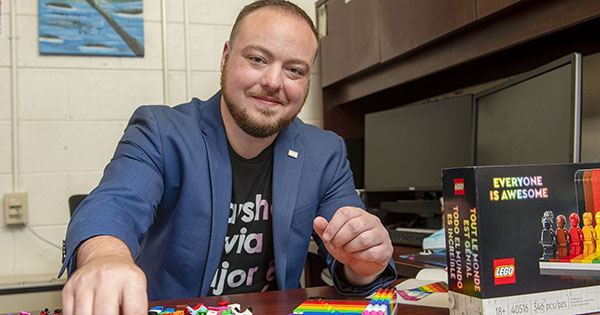JOHNSON CITY – In his classrooms and in other supervisory settings, Dr. Mickey White prepares his students at East Tennessee State University to step into the role of a counselor.
He trains them for the types of situations they may face. He provides feedback in
the clinical setting. He shares research and best practices, and he leads important
exploratory discussions on the complex ethical standards that govern the profession.
Unfortunately, when turning to any research and best practices that specifically address the experiences of LGBTQ counselors, White says the bookshelves are almost bare.
It’s something he hopes to change.
Prior to joining the ETSU faculty in 2019, White was a graduate student at the University
of North Texas, where his doctoral dissertation focused on the experiences of Black
transgender men. Interestingly, the day he defended his dissertation happened to
coincide with Juneteenth. With his doctoral degree under his arm, he made the move
to Johnson City, where, this fall, he begins his third year as a faculty member in
the ETSU Department of Counseling and Human Services.
And he has continued his research into the experiences of queer and transgender persons,
focusing now on the journeys of those who work in the counseling profession as counselors,
educators or supervisors.
“One of the messages I frequently drive home to my students deals with authenticity
and the importance of being genuine in their relationships with their clients,” White
said. “There is a personal exchange between the client and counselor, and it’s a
place where people are to feel safe. 
“Depending on the client, there may be times when queer and trans counselors are faced
with whether or not they should self-disclose their sexual or gender identity,” he
added. “How do you navigate this? Is this something that is relevant and should
be shared? Unfortunately, there isn’t much research available that guides counselors
on what they should do.”
White believes the answer to this involves many factors. “There are times when it
may be appropriate to disclose this, but it is extremely important that counselors
not only be comfortable with this decision, but that they also feel safe in doing
so,” White said.
To understand the issues potentially involved in the decision-making process, White
and a colleague at University of North Carolina–Pembroke are planning to conduct qualitative
research interviews with counselors and educators they know to gain additional insights.
“In some ways, it may seem incongruent – a therapy session is where people should
feel comfortable sharing everything, but is the counselor’s gender or sexuality something
that is okay to be shared?” White asks.
In addition to this work on the self-disclosure practices of counselors and educators,
White is pursuing other research projects in the LGBTQ+ space, including a focus on
the perceptions toward transgender and queer counselors. Is there a stigma present
that suggests transgender counselors are only trained to work with transgender clients?
Is there an impression that these counselors only care about gay or transgender issues?
He is also involved in a project that evaluates peer-led transgender support groups.
“Whether these are offered online or in-person, support groups are highly valuable
to members of the transgender community,” White said. “In most cases, there is little
guidance for persons who assume a leadership role in those groups.
For a lot of reasons, there are some leaders who may not be ready to facilitate the types of discussions that may occur.
“I’m interested in learning about what has worked well in groups, what hasn’t, and
use that information to create training resources for those who lead those groups.”
Another active research study of White’s involves a project for the Society for Sexual,
Affectional, Intersex and Gender Expansive Identities (SAIGE) to do a “photovoice”
study of LGBTQ+ activists’ experiences. In a photovoice study, participants take
photos that relate to their experiences as activists and then process to determine
overarching themes and give voice to their experiences.